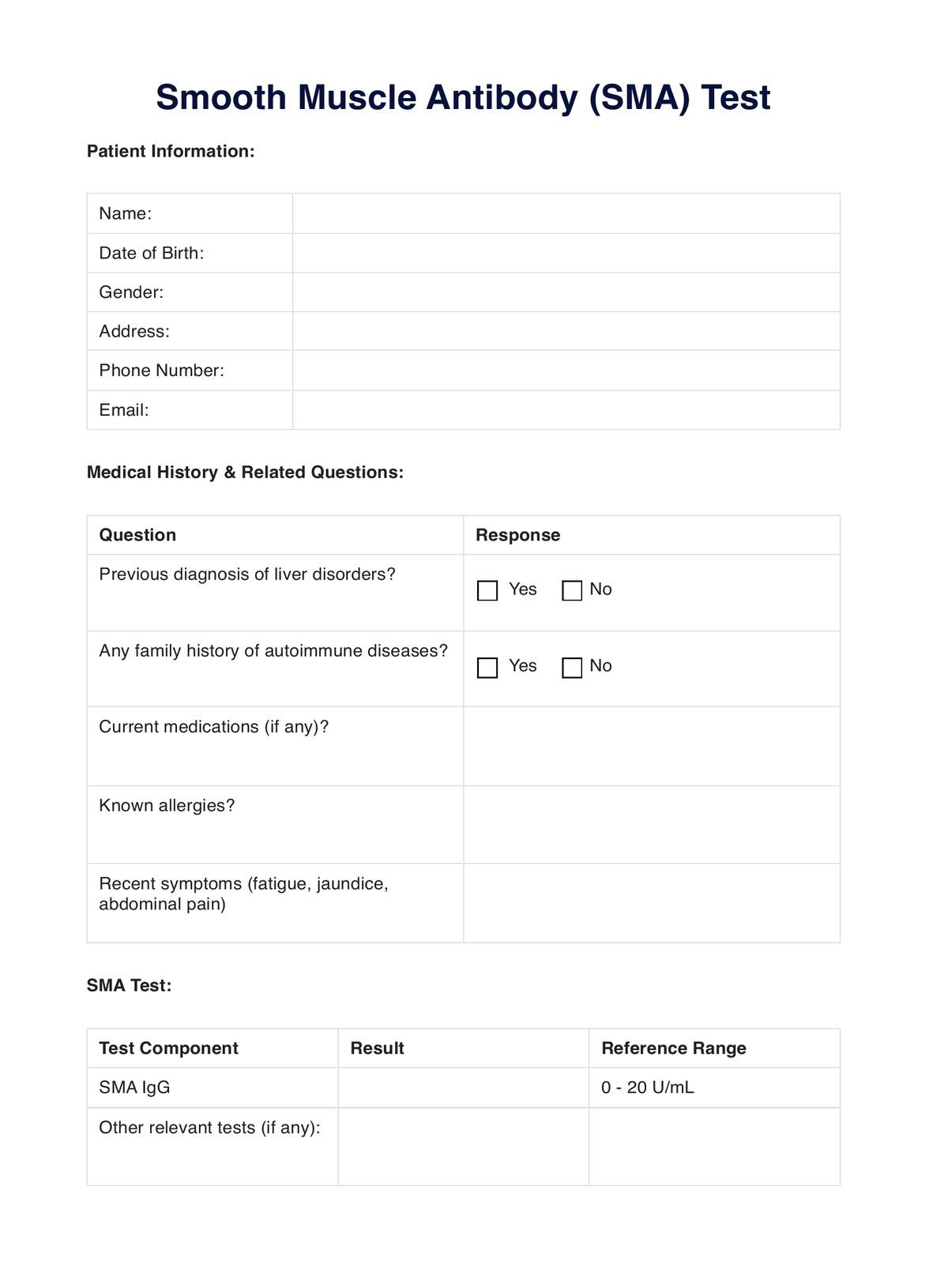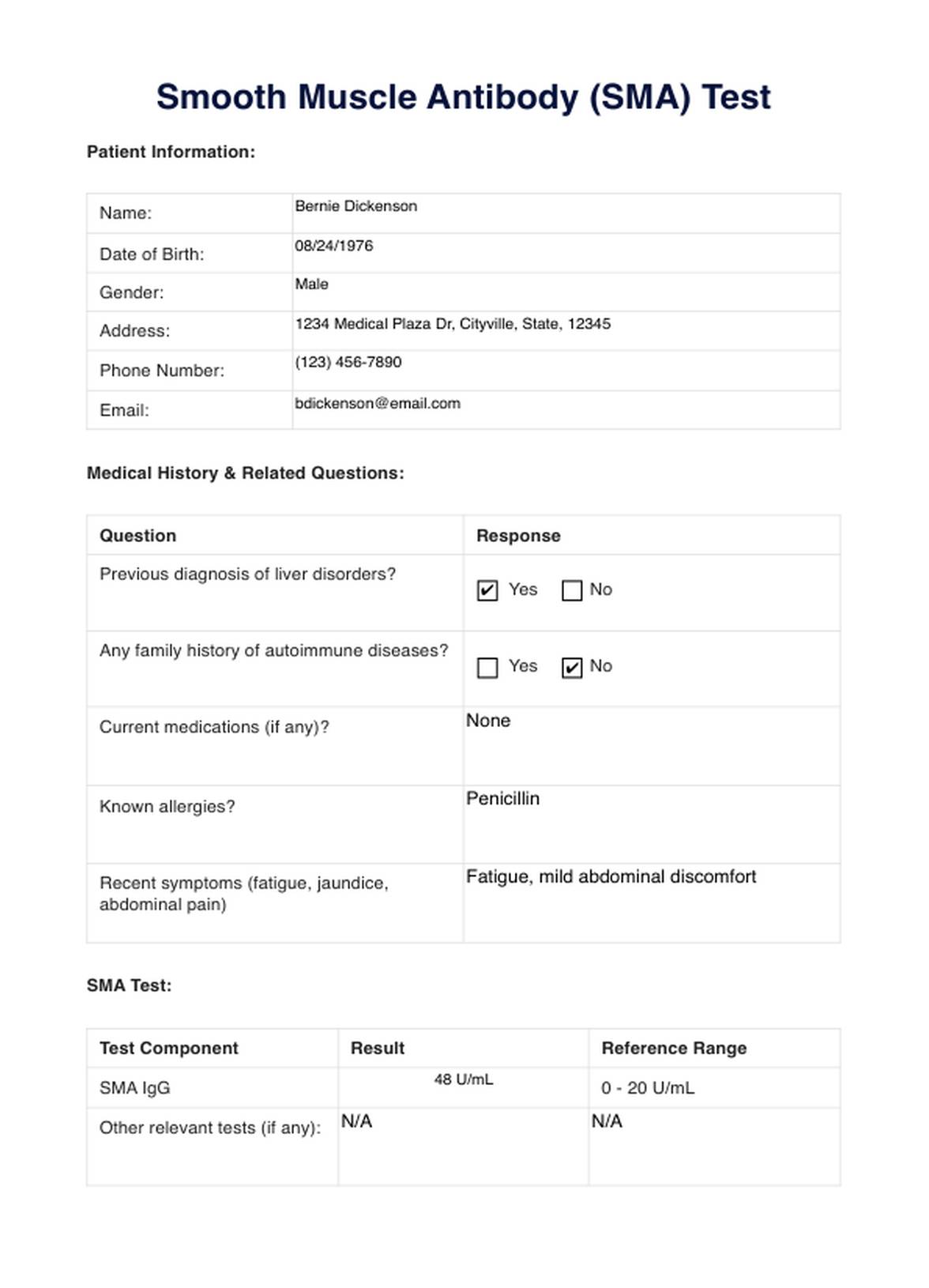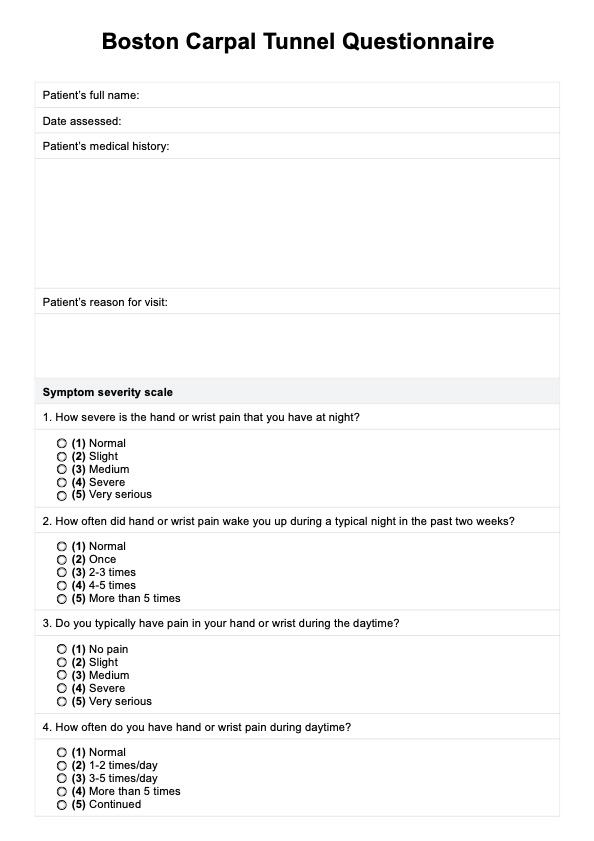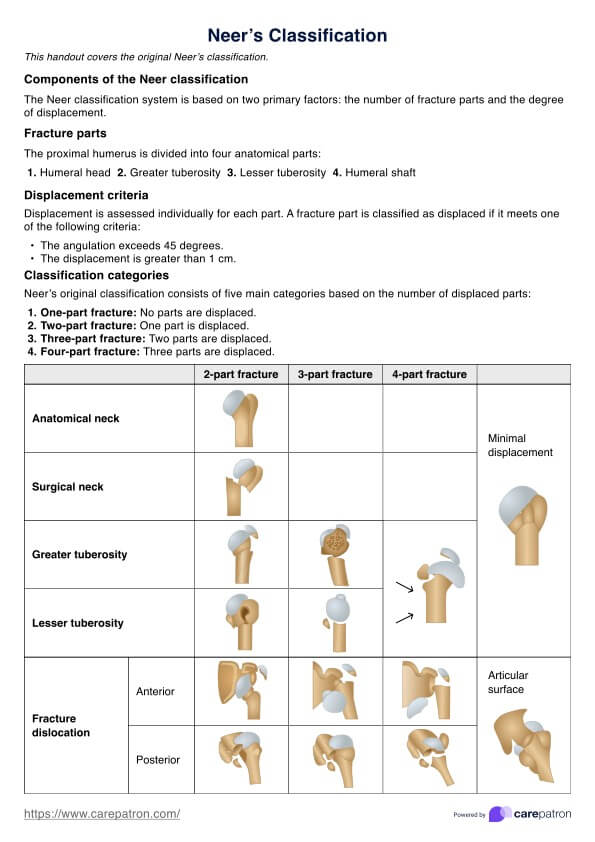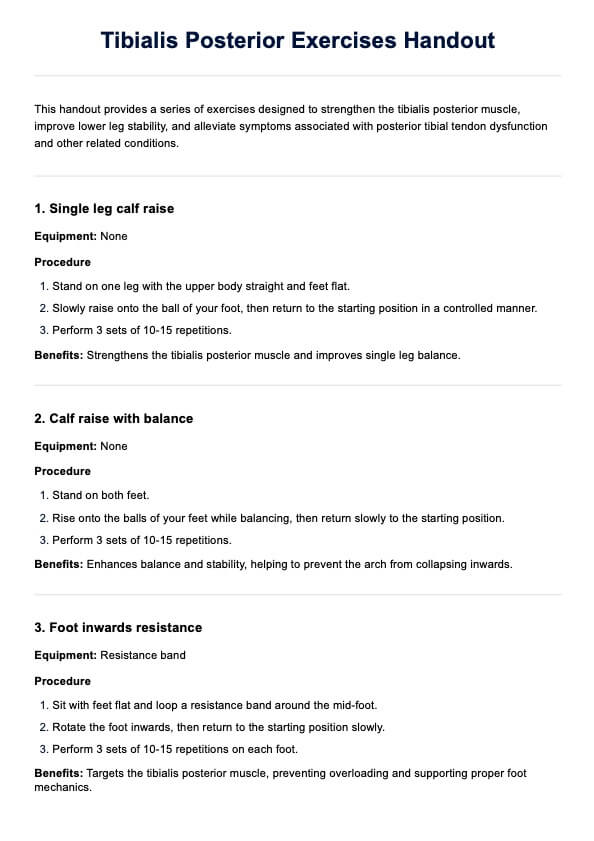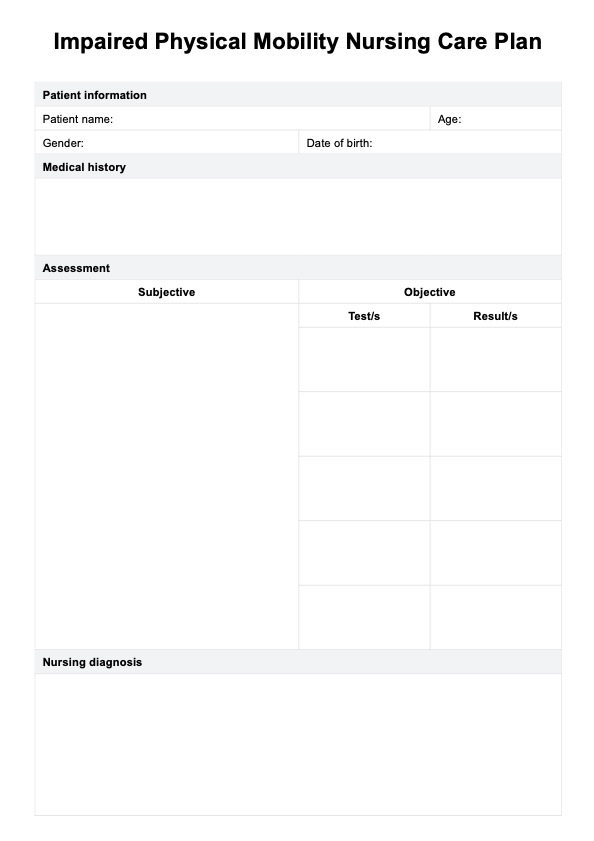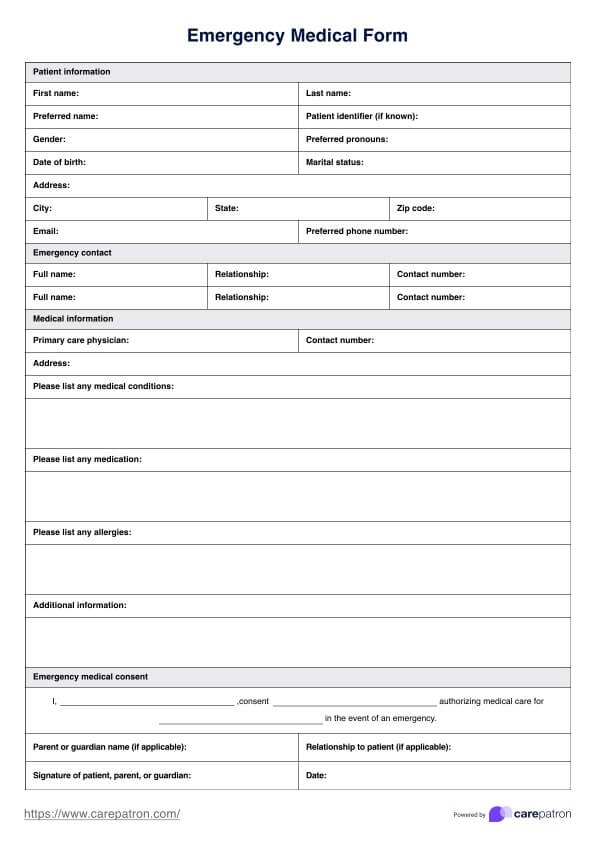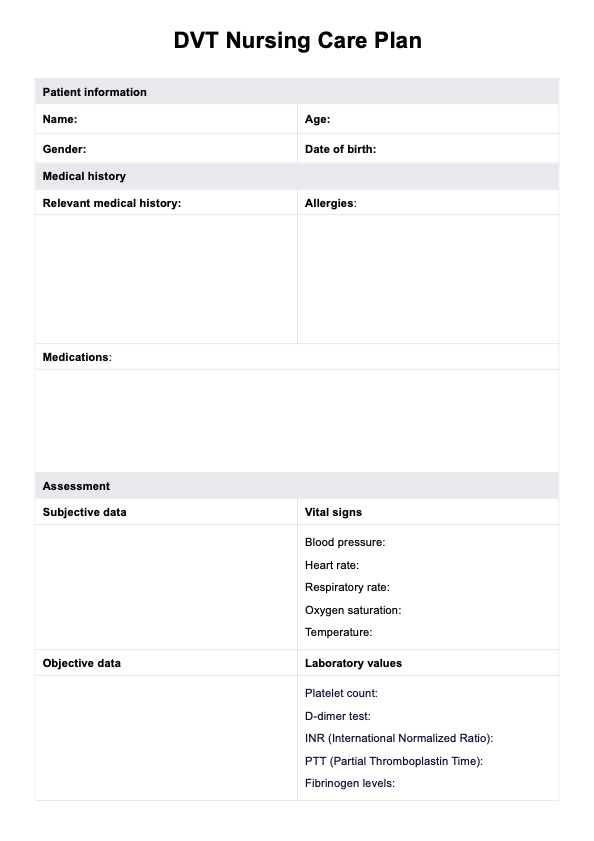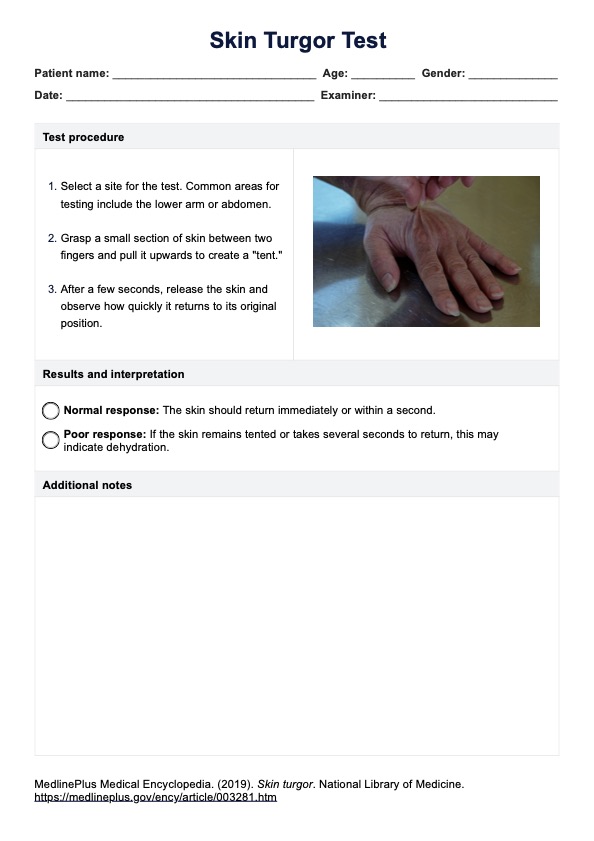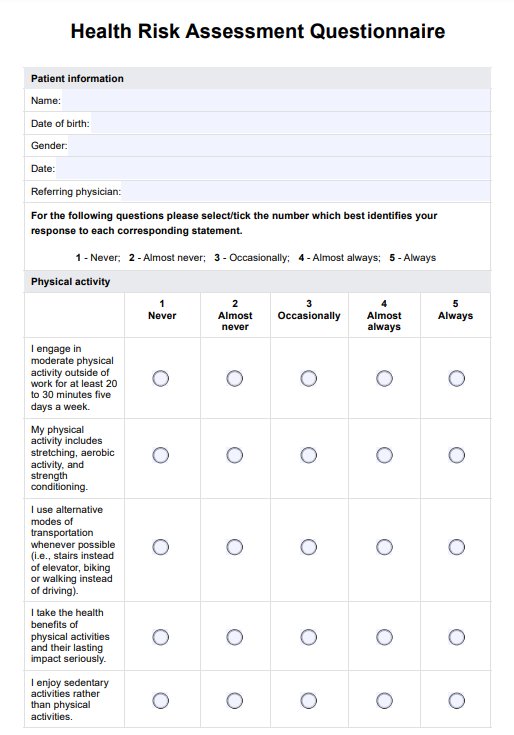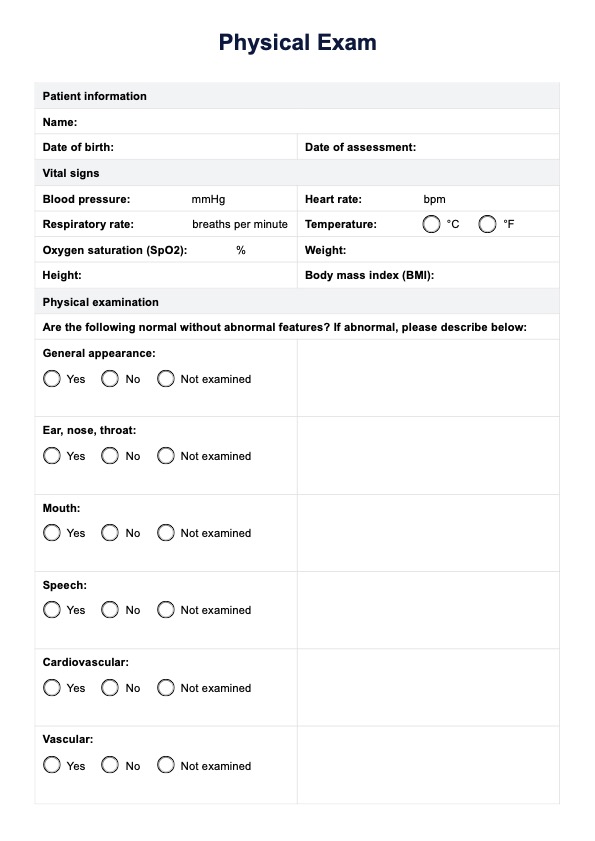SMA
Unlock efficient, comprehensive healthcare with Carepatron's SMA Test guide. Seamless testing, accurate results, and effective patient care. Download Free PDF!


What Is A Smooth Muscle Antibody (SMA) Test?
In medical diagnostics, specific tests are pivotal in unraveling the mysteries that often shroud autoimmune disorders. One such crucial test is the Smooth Muscle Antibody (SMA) Test, a blood test specifically designed to detect the presence of antibodies against smooth muscle tissue in the body.
When your immune system, the body's defense mechanism, mistakenly identifies your tissues as foreign, it produces antibodies to attack them. This scenario is typical in autoimmune diseases, and the SMA test plays a critical role in diagnosing conditions such as autoimmune hepatitis, where the immune system attacks the liver cells, leading to inflammation and potential liver damage.
The SMA test isn't just about identifying antibodies; it's about understanding the story they tell. Elevated levels of smooth muscle antibodies in your blood can indicate ongoing autoimmune activity within your body, often pointing healthcare professionals toward diagnosing a liver-centric autoimmune disorder. However, it's important to note that while the test is a powerful tool in the diagnostic process, it is not the sole determinant. Medical professionals often use SMA test results with other tests and to comprehensively view a patient's health status.
The SMA test is a beacon, guiding healthcare professionals through the often murky waters of autoimmune disorders. It's not just a test; it's a lifeline for individuals seeking answers amidst the complexities of their symptoms. With resources like Carepatron, managing and understanding the intricacies of such tests becomes a streamlined, user-friendly experience.
SMA Template
SMA Example
How To Use the Smooth Muscle Antibody (SMA) Test
The Smooth Muscle Antibody (SMA) Test is a crucial diagnostic tool in the medical field, particularly for conditions related to autoimmune disorders of the liver. This test, sensitive to antibodies against smooth muscles, is instrumental in diagnosing diseases like autoimmune hepatitis. Here's a step-by-step guide for healthcare professionals to use this test effectively:
Understand the Patient's History
Before administering the test, gather comprehensive medical and family histories, focusing on liver disorder symptoms or autoimmune diseases. This background helps in contextualizing the test results later.
Explain the Procedure
Ensure the patient understands the significance of the SMA test, what it entails, and any required preparation. Clear communication helps in managing patient anxiety and cooperation.
Collect the Blood Sample
With the patient's consent, draw a blood sample following standard phlebotomy procedures. Proper handling and storage of the sample are crucial to prevent any degradation of potential antibodies.
Send for Analysis
Forward the collected sample to a certified laboratory for SMA testing. It's essential to use reliable services to ensure accuracy in the results.
Interpret the Results
Once the results are back, interpret them considering the patient's overall health context. Elevated SMA levels indicate conditions like autoimmune hepatitis, but consider other symptoms and factors.
Discuss the Findings
Schedule a consultation with the patient to discuss the results, their implications, and the next steps. This conversation might involve discussing further testing, potential treatments, or lifestyle adjustments.
Plan the Follow-Up
Based on the test findings, plan and initiate a follow-up pathway. This plan may include more detailed tests, referrals to specialists, or immediate treatment interventions, depending on the severity of the findings.
In conclusion, the SMA test is valuable in diagnosing and managing autoimmune liver diseases. It requires a meticulous approach, from understanding the patient's background to interpreting the results within the broader health context to ensure accurate diagnosis and effective treatment planning.
When Would You Use This Form?
Navigating the complexities of autoimmune disorders requires precision, and the Smooth Muscle Antibody (SMA) Test is a resource that healthcare professionals rely on for accurate insights. Understanding when to utilize this valuable diagnostic tool can significantly impact patient outcomes. Below are specific scenarios where this form is indispensable:
- Suspected Autoimmune Hepatitis (AIH): If a patient exhibits symptoms such as jaundice, fatigue, or abdominal pain, it's prudent to use this form to rule in or rule out AIH, a condition where the body's immune system attacks the liver.
- Unexplained Liver Function Abnormalities: When routine tests indicate abnormal liver function without a clear cause, the SMA test can provide insights into whether an autoimmune response is responsible.
- Monitoring Existing Liver Conditions: For patients with a known history of liver conditions, especially autoimmune-related, periodic SMA testing is crucial for tracking the disease's progression or remission.
- Differentiating Liver Disorders: In cases where symptoms suggest a liver disorder but the exact type is unclear, this test helps determine autoimmune conditions from other liver diseases.
- Pre-Surgical Screening: An SMA test is vital to understand the patient's autoimmune status before liver surgery or transplants, informing the surgical approach and post-operative care.
In conclusion, the SMA Test form is an essential component in the arsenal of healthcare practitioners dealing with liver disorders, particularly of autoimmune origin. Its timely and appropriate use ensures accurate diagnosis and effective treatment planning, ultimately enhancing patient care quality.
What do the Results Mean?
Interpreting the results of a Smooth Muscle Antibody (SMA) Test requires a nuanced understanding of immunological markers and their implications in a patient's health context. Here's what healthcare professionals need to know:
The SMA test primarily identifies the presence of antibodies against smooth muscles in the blood, commonly associated with autoimmune hepatitis (AIH). However, the interpretation isn't straightforward and depends on various factors:
- Positive SMA Result: This indicates the presence of smooth muscle antibodies in the patient's blood. While this is a significant marker for AIH, it's not exclusive to it. The healthcare provider must consider other clinical presentations and possibly further testing to confirm a diagnosis.
- High Antibody Levels: Elevated levels suggest a solid autoimmune response, often correlating with more severe or active disease states. This requires immediate attention and potentially aggressive treatment.
- Negative SMA Result: A negative result doesn't entirely rule out AIH or other autoimmune conditions. It may necessitate additional tests, especially if symptoms persist.
- Fluctuating Levels Over Time: Changes in antibody levels can indicate the progression or regression of the disease, helping assess the effectiveness of treatments and requiring adjustments where necessary.
In conclusion, an SMA test result is a piece of the larger puzzle in understanding a patient's autoimmune condition, particularly relating to the liver. It demands careful interpretation within the broader clinical picture to guide accurate diagnosis and effective therapeutic strategies.
These sections delve into the practical application of the SMA Test, guiding healthcare professionals on its appropriate use and the critical interpretation of the results within the clinical context.
Research & Evidence
The Smooth Muscle Antibody (SMA) test holds a pivotal role in diagnosing and managing autoimmune hepatitis (AIH) and other related autoimmune liver diseases (ALD), supported by extensive research and clinical trials. Its importance stems from its ability to identify antibodies the immune system erroneously produces against its tissues, a hallmark of autoimmune disorders.
Research conducted by Yurttutan Uyar, N. et al. (2023) underscored the critical role of SMA in AIH diagnosis, especially considering the co-positivity with anti-nuclear antibody (ANA). The study, which involved patients with suspected AIH, revealed that a significant proportion of individuals with SMA positivity also exhibited ANA positivity, a crucial diagnostic indicator for AIH and a potential marker for other autoimmune diseases (Yurttutan Uyar et al., 2023).
In another insightful study, Yuanyuan, W. highlighted the diagnostic relevance of detecting additional autoantibodies, including anti-myeloperoxidase (MPO), in serum samples alongside SMA. The research found notable differences in the positive MPO, ANCA, and SMA rates between patients with AIH and those diagnosed with primary biliary cirrhosis (PBC), emphasizing the antibodies' diagnostic significance.
Moreover, a large-scale study involving 593 participants conducted by Duran A. et al. (2022) evaluated the role of autoantibodies in the clinical diagnosis of various liver diseases and the detection of associated autoimmune conditions. This study reaffirmed the significance of several autoantibodies, including SMA, in diagnosing ALD and systemic autoimmune rheumatic diseases (SARD) (Duran et al., 2022).
These scientific inquiries underscore the SMA test's clinical utility, advocating its integration as a routine diagnostic procedure for AIH and associated autoimmune disorders. The test's proficiency in detecting specific autoantibodies facilitates early diagnosis, enabling strategic clinical interventions and optimized patient care protocols.
References
- Yurttutan Uyar, N., et al. (2023). The frequency of anti-smooth muscle antibody and anti-nuclear antibody co-positivity and their contribution to the diagnosis of autoimmune hepatitis. ACM Journal. https://dx.doi.org/10.38053/acmj.1250769
- Yuanyuan, W. Date Unknown. Clinical value of anti-myeloperoxidase antibody in the diagnosis of autoimmune hepatitis.
- Duran, A., Çetin Duran, A., & Taşkıran, İ. (2022). Investigation of the Contribution of Autoantibodies to Clinical Diagnosis in Liver Pathologies and the Identification of Accompanying Autoimmune Diseases. Medical Bulletin. https://dx.doi.org/10.5578/mb.20229907
Commonly asked questions
The Smooth Muscle Antibody (SMA) test is crucial for diagnosing conditions like autoimmune hepatitis, as it detects antibodies that attack the body's tissues.
Yes, Carepatron allows patients to securely access their test results through its online patient portal, ensuring privacy and convenience.
Telehealth platforms like Carepatron enhance communication between patients and providers, allow swift transmission of test results, and facilitate virtual follow-up consultations, making the process efficient and comprehensive.


